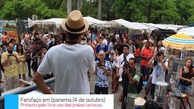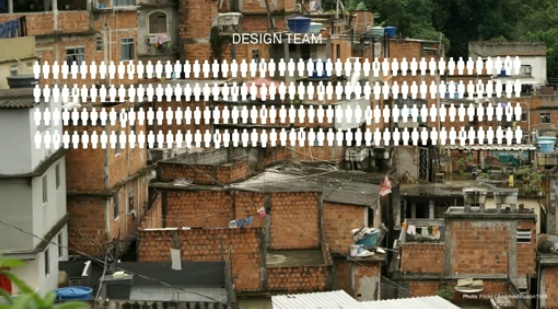Monthly Digest
Latest News and Opinion on and from
Rio de Janeiro's Favelas
October 2015
Volume V Issue 10 |
 |
|
Welcome to our October digest with the latest news from RioOnWatch (Rio Olympics Neighborhood Watch), Catalytic Communities' project to bring visibility to favela perspectives on the rapid transformations in Rio through the 2016 Olympic Games. For this month's RioOnWatch articles see below and for an exhaustive list of news reports and features on favelas from the full range of English-language media sources, see the right-hand column. Should this email appear clipped, you can click at the bottom to view the entire message in your browser.
October brought more devastating 'lightning evictions' to Vila Autódromo, where five homes were demolished by the City without warning to residents. 22,059 families have been resettled since 2009, according to the City, which has served to further segregate an already divided city. The potential severe psychological effects caused by the destruction of a community have been documented in other eviction contexts. Yet some 50 Vila Autódromo families remain strongly determined to stay, continually updating the community's People's Plan for how they can co-exist with the Olympic Park next door.
As those families build their active media presence to denounce evictions, the growth of digital media is empowering people across the city to tell their stories. A video of police tampering with a shooting scene in Providência went viral on social media and within hours, drew global news coverage. Appropriately, this year's Blog Action Day focused on the theme, 'Raise Your Voice.' Favela-based journalists contributed pieces on the power of community journalism, as well as the censorship and threats that challenge it. We also highlighted the talented community photographers of the Imagens do Povo collective.
The participation of diverse perspectives in the media has been critical in the debate around beach robberies, vigilantism, and the police actions and bus route changes making it more difficult for Rio North Zone residents to get to the South Zone. One RioOnWatch article points out the irony of the government's investment in digital inclusion in favelas just as police tactics and policies reinforce spatial exclusion.
Important longitudinal research revealed that more Pacifying Police Unit (UPP) police officers perceived negative attitudes from residents toward the program in 2014 than in previous years. The complexity of life under the control of drug gangs has clearly not become any more simple under UPP authority. Meanwhile, Brazil's prisons face a crisis of violence, intolerable conditions, and overcrowding. Security is complicated in Minha Casa Minha Vida (MCMV) public housing too, where residents struggle with the presence of traffickers and militias. Significant new financial burdens, poor infrastructure, and long commutes in MCMV housing risk reproducing social inequalities.
In contrast to struggling public housing condominiums, favelas like Asa Branca are thriving with projects to promote community integration. We featured Asa Branca in celebration of the World Cities Day theme, 'Designed to Live Together,' along with Vila Autódromo's People's Plan which has been continuously updated to live together with the Olympics, and Morro do Formiga, where community gardens and water societies enable residents to live together with the environment.
Environment and sustainability projects, such as a sewage treatment biodigester in Vale Encantado, are increasingly important in Rio. Scientists predict Rio will be the worst affected by climate change of all cities in South America. These effects already disproportionately affect low-income peripheral neighborhoods as important research in Rio's urban heat islands indicates.
This month also saw the conclusion of Complexo da Maré's first-ever 'Food of the Favela' festival. Like the Afro-Rio Walking Tour of the Port Zone, the food festival highlights an oft-overlooked but important aspect of its locale's culture and heritage.
Finally, we want to know what the people who've made CatComm and RioOnWatch a success over our fifteen years—YOU!—are up to today, and how we can best support our collaborators going forward. Please take a few minutes to share your thoughts on our birthday questionnaire! They're very important to us!
We hope you enjoy this month's carefully compiled digest and video recommendations below. Please share and don't forget to like us on Facebook and follow us on Twitter.
|
 |
|
The Vila Autódromo People's Plan affirms the community’s commitments to remaining in place and to the preservation of the local lagoon environment. Moreover, the urbanization plans confirm the residents want to, and can, co-exist in harmony with the State, the construction of the Olympic Park, and the global community brought by the Olympics.
Residents of Morro da Formiga live with nature and sustainability in mind, with cooperatively-managed water infrastructure, community gardens, horticulture lessons, and beekeeping. On September 9 RioOnWatch accompanied Amadeu Palmares da Silveira on a tour of his neighborhood where he spoke about the community’s connection with the environment.
Today at approximately 8,000 residents, Asa Branca still feels intimate. The community has never been occupied by drug traffickers and local organizing has been a long-term constant contributing to a sense of safety. Residents know their neighbors, welcome new members, and participate in community-organized classes and events. Asa Branca exemplifies how favelas are “designed to live together.”
Hilaine Yaccoub, PhD in Anthropology of Consumption at the Fluminense Federal University (UFF), came to this conclusion after four years of research in the Barreira do Vasco favela in Rio de Janeiro: “The favela is at the forefront of the shared economy and collective consumerism. It is an intrinsic value that should serve as an example for many societies."
A recent study has investigated how Minha Casa Minha Vida housing program has impacted the livelihoods of beneficiaries, and found that the program is not always synonymous with progress and economic stability, as preached by the official narrative.
This summer is set to be Rio’s hottest in years. And this is only the beginning. Thermometers in the state capital will show an average temperature increase of one degree Celsius over the next five years, according to a global warning released on October 13 by the Urban Climate Change Research Network, which brings together 600 scientists from 150 different cities.
The stopping and searching of suspects, reports of incidents in the police stations, seizures of drugs and arms, arrests and clashes with traffickers. More and more common among the Pacifying Police Units, these actions demonstrate that the project—created to change the paradigm of policing favelas, especially in terms of relating to and connecting with residents—is increasingly approaching the conventional modus operandi of the Military Police.
Summer is approaching in Brazil and with it come searing temperatures upwards of 40 degrees Celsius. However, not all areas in Rio de Janeiro’s metropolitan region will experience this heat to the same degree. Studies show that some parts of Rio are more susceptible to high temperatures than others.
Around 5 o’clock this morning, Friday October 23, the Municipal Guard policing force and government representatives arrived in Vila Autódromo, the community bordering the Olympic Park in Rio’s West Zone, to demolish more homes in the neighborhood. “The City continues to spread terror in the community,” residents wrote on Facebook. “We are now surrounded and nobody knows for sure what’s going on!”
What is painfully obvious about the communities targeted for Knowledge Ships is that they are subject to both the City’s digital inclusion and social exclusion policies. While embracing the benefits of their newfound, City-sponsored technological access, it is the residents of these same communities that are simultaneously fighting City-sponsored segregation.
Misha Glenny’s latest book charts the incredible story of Nem, born Antônio Francisco Bonfim Lopes, from his early life to his entry into the drug trafficking business aged 24 and his four years as kingpin: a long reign, given that “the average life expectancy of the Rocinha dons, once they reached the top, was approximately ten months.” Nem’s rise paralleled the explosion of the cocaine trade in Rio in recent decades.
Five years after the first Minha Casa Minha Vida (MCMV, or My House My Life) public housing apartments were delivered, residents still encounter violence, structural problems, fraud, and a lack of publicly-funded infrastructure and recreation spaces. In some complexes problems stem from high default rates; in others drug trafficking undermines a sense of security
This year, the Rio de Janeiro Youth Forum published a report which contains numerous allegations of journalists who were threatened, searched and removed from their homes and places of work, and that these threats have increased within Rio’s favelas following the introduction of Pacifying Police Units.
Every day, young communicators from favelas experience the pain and joy of reporting their reality, bringing to light a media form that is no longer seen as a longed-for necessity but which has become a reality in the favela territories, exposing the real day-to-day life there and placing residents as the main characters. Some call this community, alternative, or popular journalism. Others only understand the term once they are involved.
Imagens do Povo is based in Maré, a complex of favelas in Rio’s North Zone, and hosted at the Favelas Observatory, a center that coordinates research, capacity-building, consulting work and public action around favela-related issues and urban phenomena. The project’s School for Popular Photographers combines instruction on photographic technique with discussion of social issues and the democratization of communication.
The arrival of Web 2.0, characterized by increased ways of sharing on the Web, has made it possible for any citizen with access to the Internet to produce their own content and publish it on various platforms such as blogs, websites, and more recently social media, without any cost. Just a few years ago, only a major media organization could afford the exorbitant costs of the necessary equipment for a live transmission. Today, any person with a cellphone and an app such as Twitcasting can take part in this endeavor.
The Maré favela complex, in Rio’s North Zone, is currently hosting the first Comida de Favela, a food festival celebrating the “flavors of Maré” in which 16 local restaurants have prepared special dishes to serve. Opening on September 17 and running until October 17, the event aims to celebrate and promote the cultural and culinary identity of Maré’s 16 communities through traditional cuisines that show the creativity and diversity of the favela.
Last Thursday night, students, public intellectuals, regular Cariocas, government officials, and some foreign tourists gathered at the Voluntários da Patria School in Ipanema to discuss problems surrounding favelas. The event was planned by Henrique Mello, a history teacher at the school. He believes that if wealthy South Zone residents speak up about the problems in the favelas, the City will do something.
On Tuesday October 6, Studio X Rio de Janeiro hosted the event “When People Take Control: Bottom-Up House Making” to discuss alternative ways the world can house all its inhabitants given the rapid rates of urbanization in the 21st century.
During the month of September 2015, a team of engineers, masons, and workers in Vale Encantado began the construction of the community’s second biodigester, this one designed as the first step towards a sewage treatment biosystem for the community. Like about 66% of the city of Rio de Janeiro, Vale Encantado's untreated sewage currently runs directly into nature.
Community-based sustainability projects are an integral part of the rich history of the community of Morro da Formiga. Located in the North Zone of the city, Formiga borders the vast Tijuca Forest and the neighborhood of Tijuca. Joining other Rio communities such as Vale Encantado and Vila Laboriaux, Formiga is developing environmental initiatives to secure a sustainable future for the favela.
Tension between Rio de Janeiro’s North and South Zone residents has reached a new peak because of the threat of violence on Rio’s beaches in this pre-Olympic year. On August 23, buses filled with around 150 teens were stopped in Botafogo, on their way to the South Zone beachside neighborhoods on the pretense that youth on board were coming with intentions to rob and engage in violence.
On Saturday, October 3, around 60 Rocinha residents gathered in the Praça Roupa Suja to discuss their hopes and dreams for the community in the latest event of the “If The City Were Ours” series. Residents were invited to ask themselves: “What if we, who every day face full buses and trains, long lines at hospitals, and suffer with poor public education, could give our opinions and make decisions regarding public policy?"
In the field of psychiatry, there has never been a word that formally diagnoses the pain and trauma resulting from being removed from a home. In her book, Root Shock: How Tearing Up City Neighborhoods Hurts America, and What We Can Do About It, research psychiatrist Dr. Mindy Fullilove gives this phenomenon a name: root shock.
On Tuesday, September 29, 17-year-old Eduardo Felipe Santos Victor was shot dead in the Providência favela. The official report released by the Military Police after Santos’ death stated that the adolescent died “after responding to the arrival of the police with gunfire,” implying the killing constituted an act of self-defense by the policemen. However a graphic video shot by a local resident and posted on social media documented police officers planting a gun on Santos’ body.
The Quilombo das Guerreiras occupation is a symbol of resistance and community organizing. From 2006 through 2013 over one hundred families occupied and built a community in an abandoned warehouse in Rio’s Port region. RioOnWatch caught up with Maria Ivanilde Moraes, one of the leaders of the occupation, to hear her story of resistance and struggle.
Last Tuesday, September 22, the Popular Committee for the World Cup and the Olympics launched a new dossier on the violation of the right to sport, documenting this aspect of what the Committee argues to be an Olympic legacy of exclusion.
Rio’s Port is deeply connected to the African and Afro-Brazilian history of the city, and Brazil as a whole. Approximately five million of the 10 million African slaves shipped to the Americas were brought to Brazil, and Rio de Janeiro was the main point of arrival, making it the largest slave port in world history. In the early 19th century half of the city’s population was enslaved. |
 |
Stay Connected with RioOnWatch
|
|
|
The Globe and Mail October 30
Review: Misha Glenny’s Nemesis just the latest to fail to capture Brazil’s complexities by Stephanie Nolen
The Rio Times October 29
FLUPP, Literary Festival for Rio’s Favelas, Returns for 4th Edition by Chesney Hearst
The Guardian* October 28
Brazil officials evict families from homes ahead of 2016 Olympic Games by Bruce Douglas
International Business Times* October 28
Rio Olympics 2016: Local Brazil Governments 'Resettling' Thousands of Families Before Games Begin by Michelle Mark
Fox News Latino October 28
Rio de Janeiro wants to turn Olympic Games district into tourism destination by Carlos A. Moreno
RT October 28
Will Rio de Janeiro be ready to host the 2016 Olympics?
Fox News Latino October 28
200-Year-old cobblestone street destroyed in Rio by EFE
The Rio Times October 28
Commission in Brazil Proposes Lowering Age to Buy Guns by Lise Alves
Reuters October 27
Brazil's most costly football stadium may not host Olympic games by Anthony Boadle
Global Post* October 27
#BlackLivesMatter has gone global. And Brazil needs it — badly by Will Carless
The Rio Times October 26
PlayLife: An Initiative for Sports in Rio’s Favela Communities by Lise Alves
France 24 October 24
Brazil: How real is Rio's renewal ahead of 2016 Olympics? by Fabiola Ortiz
The Guardian October 22
Military policeman's ball makes girls from Rio's favelas princesses for a day by Jonathan Watts
The Rio Times October 21
Operação Verão 2015 Implemented on Niterói Beaches by Chesney Hearst
The Guardian October 21
Which skin colour are you? The human swatch chart that confronts racism by Tom Seymour
The New York Times October 20
The Myth of Welfare’s Corrupting Influence on the Poor by Eduardo Porter
Americas Quarterly October 20
Latin America’s Poverty Is Down, But Violence Is Up. Why? by Robert Muggah
Rio 2016 October 19
Barra Olympic Park, heart of the Rio 2016 Games, more than 90 per cent complete
GreenBiz October 19
How Brazil is rethinking governance to clean up slums by Maria Antonia Tigre
Naija 247 October
The fight for the rights to land in Lagos by Tolu Ogunlesi
CCTV America October 19
Man-made beach in Rio’s poorer north part of Olympic rehab by Lucrecia C. Franco [VIDEO]
PBS October 18
Organizers scrap viral tests of Rio’s sewage-filled waters ahead of Olympics [VIDEO]
The Rio Times October 16
How to Visit a Favela Community in Rio de Janeiro: Sponsored by Nicole Eberhard
Wired October 15
Misha Glenny: 'modern Brazil is imprisoned by stereotypes' by Gian Volpicelli
Rio Real Blog October 15
King of the hill of Rocinha: new book, Nemesis, by Misha Glenny by Julia Michaels
TeleSUR October 13
Brazil May Lower the Legal Age for Owning a Gun
TeleSUR October 13
UN Body Accuses Brazil's Military Police of Killing Kids to 'Clean Streets' for Olympics, World Cup
Green Bay Press Gazette October 13
First Amendment column: Blame it on Rio by Gene Policinski
Munchies - Vice October 13
What It’s Like to Hold a Food Festival in a Rio de Janeiro Slum by Donna Bowater
The Rio Times October 12
Special Events for Children’s Day Held by UPP in Rio de Janeiro by Shalina Chatlani
The Rio Times October 12
Rio Protests High Number of Violent Deaths This Year by Lise Alves
Life in Favela of Rocinha October 12
A Star is born...the Pride of Rocinha! by lifeinrocinha
The Washington Post October 12
In Rio, Olympic ambitions, but a bottom-line conscience by Rick Maese, Dom Phillips
Daily Mail October 11
Moving pictures of the families living in Rio's favelas who are refusing to give up their homes as frantic Olympic Park building continues by Lydia Willgress
The Guardian October 10
Can art change the world? The work of street artist JR – in pictures
Open Democracy October 10
Police terror in Brazil by Jamie A. Alves
The Guardian October 9
Violent deaths in Brazil surge to peak of 58,000 amid Olympic safety fears by Reuters
The New York Times October 9
Tour and Resort News: Tennis in Florida; Paddleboards in Africa by Elaine Glusac
Culinary Backstreets October 9
Food Complex: A Favela's Culinary Side Emerges by Catherine Osborn
New Books in Urban Studies October 9
Erika Robb Larkins—The Spectacular Favela: Violence in Modern Brazil by Keith Simmons
LinkedIn October 9
Brazil: 'safe' or 'stay safe'? by Mark Hillary
ESPN October 8
Rio de Janeiro scrambling to prepare for Olympics by Bonnie D. Ford
The Rio Times October 8
British Expatriate Opens English School in Rocinha Favela by Chesney Hearst
The Guardian October 7
Brazilian television slowly confronts country's deeply entrenched race issues by Bruce Douglas
Sports Features October 7
Olympic belt-tightening but not for the suits by Neil Wilson
Bloomberg News October 7
2016 Rio Olympic Games Hinge on Down-to-Wire Subway Construction by Juan Pablo Spinetto, Tariq Panja
CNN October 7
Rio 2016 organizers clamp down on costs amid Brazil recession by Shasta Darlington
The Washington Post October 7
I can’t make sense of the violence I witnessed in Rio de Janeiro by Juliana Barbassa
CNN October 6
Rio 2016: City grapples with wave of crime on beaches as Olympics near
by Shasta Darlington
El Pais October 6
Businesswoman gunned down after entering Rio shantytown by mistake by María Martín
The Telegraph October 6
Nemesis by Misha Glenny, review: 'thrillerish' by Toby Lichtig
The Independent October 6
Satnav leads pensioners into drug gangs' deadly favela shoot-out in Brazil
by Kashmira Gander
SBS October 6
Rio mayor 'using' Olympic Games
by AAP
The Rio Times October 5
Opinion: The Green-go-fication of Rio de Janeiro by Alfonso Stefanini
OZY October 5
Like 'Narcos'? Here's the Grittier, Brazilian Version by Shannon Sims
The Washington Post October 5
How directions on the Waze app led to death in Brazil’s favelas by Dom Phillips
The Telegraph October 5
Pensioner shot dead after following phone app through Brazil favela by Donna Bowater
The Globe and Mail October 4
Brazil's brutal prison system in crisis proves a tough cage to rattle by Stephanie Nolen
BBC October 3
Eduardo Victor killing: Police held for 'planting gun' [VIDEO]
BBC October 3
Rio de Janeiro: Beguiling, beautiful and brutal by Wyre Davies
The Irish Times October 3
Nemesis: One Man and the Battle for Rio, by Misha Glenny by Rob Doyle
Americas Quarterly October 2
What's Happening on Rio's Beaches? by Brendan O'Boyle
The Rio Times October 2
Protests Against Reduction of Rio de Janeiro’s Bus Routes by Chesney Hearst
USA Today October 1
Brazil currency tumbles, but Olympic ticket prices stay put by AP
Mirror October 1
Brazilian voice of Harry Potter shot dead during police operation in Rio de Janeiro favela by Anna Dubuis
Folha de São Paulo October 1
Brazilian Voice of Harry Potter Killed During Police Operation in Rio Favela by Luiza Franco
ideastream October
Mean Boys Can't Keep Girls Off The Soccer Field: #15Girls
|
*CatComm supported/quoted
|
|
|
RioOnWatch is a project of Catalytic Communities
October
Highlights from
CatComm
|

|
This month: Final University Tour Prior to 2016 Olympic Games
Catalytic Communities' Executive Director and urban planner, Theresa Williamson, Ph.D., will deliver lectures on a variety of topics in North America this month, including cutting edge citizen journalism and community resistance strategies within Rio's current pre-Olympic landscape. 100% of proceeds fund community efforts on-the-ground. For more information and the full schedule of talks, click here.
CatComm Held Alternative
Rio 2016 Press Event for Journalists
In parallel to the official Rio2016 World Press Briefing October 5-8, CatComm held an alternative Rio 2016 press event for international journalists. Presentations from Executive Director Theresa Williamson and Olympics historian Jules Boykoff offered local and global context for the Olympics and proposed key questions for the Mayor and IOC respectively. Candomblé practitioner and former Vila Autódromo resident Heloisa Helena Costa Berto shared her story of eviction from her long-time home and sacred site.
CatComm Questionnaire
We want to know what the people who've made CatComm and RioOnWatch a success over these years—YOU!—are up to today, and how we can best support our collaborators going forward. Please take a few minutes to share your thoughts! They're very important to us!
|
|

Farofaço em Ipanema - Oct 4 (PT)
.jpg)
Living with Nature in Morro da Formiga: An Interview with Amadeu Palmares da Silveira

Olympia (PT)

Alastair Parvin - Architecture for the People by the People
 |
|
|
|
|
